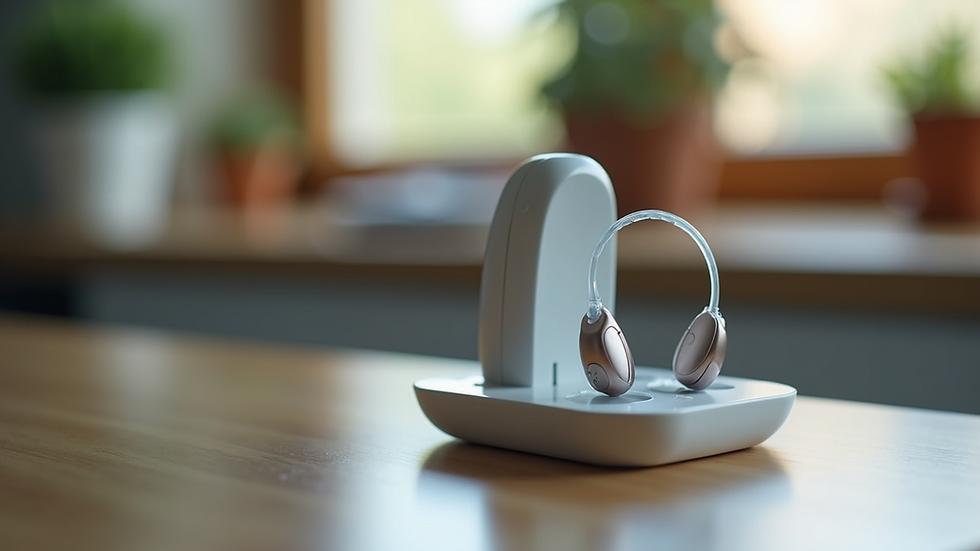Everything You Need to Know About Ear Oil Treatments
- Jun 9, 2025
- 3 min read
Ear oil treatments have been gaining popularity for ear health. Many people turn to natural remedies to maintain healthy ears, alleviate discomfort, or clear blockages. This blog post will guide you through the ins and outs of ear oil treatments, their benefits, usage, and important considerations.

Understanding Ear Care
Ear care is essential for overall health. Our ears are not just for hearing; they also play a vital role in balancing and protecting the body. Regular ear maintenance is crucial. Problems such as earwax buildup, infections, or discomfort can lead to more severe health issues if not addressed properly. While many opt for commercial ear cleaning solutions, natural ear oil treatments can provide effective relief for various ear-related concerns.
Why Choose Ear Oil Treatments?
Ear oil treatments are often preferred for their natural ingredients and holistic approach. People report various benefits from using these remedies, such as:
Moisturization: Oils can help soften earwax, making it easier to remove.
Antimicrobial Properties: Certain essential oils, like tea tree or oregano, have natural antimicrobial qualities, potentially reducing the risk of infections.
Anti-Inflammatory Effects: Oils can soothe inflammation and irritation in the ear canal.
Natural Ingredients: Many prefer treating their bodies with natural solutions, avoiding harsh chemicals often found in conventional products.
However, it is essential to choose the right oil and understand how to use it properly for maximum benefits.

Types of Oils for Ear Treatment
There are various types of oils that can be used for ear treatments, each having unique properties. Here are some common options:
Olive Oil
Olive oil is the most popular choice for ear treatments. It can help to soften earwax and has anti-inflammatory properties that reduce discomfort.
Tea Tree Oil
Tea tree oil is known for its antimicrobial properties. It can be effective against bacterial and fungal infections but should be diluted before use.
Coconut Oil
Coconut oil is a safe choice due to its soothing properties. It can also help in dissolving earwax and providing a barrier against infections.
Garlic Oil
Garlic oil has natural antibiotic properties. This oil can help fight infections, making it a good option if you suspect an ear infection.
Always consult a healthcare provider before starting any treatment to prevent adverse effects or complications.
How to Use Ear Oil Safely
Using ear oil treatments requires caution to avoid damaging the ear canal. Here are some general guidelines on safe application:
Choose the Right Oil: Ensure you select high-quality, food-grade oils.
Warm the Oil: Warm the oil slightly (but not too hot) to make it more comfortable during the application.
Use a Dropper: Use a clean dropper to apply the oil. A few drops in the affected ear should suffice.
Let It Sit: After applying, lie on your side for about 10-15 minutes to allow the oil to penetrate.
Remove Excess Oil: Use a soft cloth to catch any excess oil that drips out. Avoid using cotton swabs inside the ear.
Additionally, consider an ear care procedure from a professional if you experience pain or persistent issues.

Potential Side Effects of Ear Oil Treatments
While ear oil treatments are generally safe for most people, some may experience side effects. Here are a few potential reactions to watch for:
Allergic Reactions: Some individuals may be allergic to certain oils, especially essential oils. Always perform a patch test before applying them to the ears.
Increased Discomfort: If the oil causes increased pain or itching, stop using it immediately.
Infections: If you have a suspected ear infection, consult a healthcare professional before using oils, as some could worsen the condition if applied incorrectly.
Other Natural Remedies for Ear Health
In addition to using ear oil treatments, there are other natural remedies you might consider for maintaining ear health:
Warm Compress: Applying a warm, moist cloth can help relieve pain and discomfort associated with ear issues.
Hydration: Staying hydrated promotes ear health, as it helps thin mucus in the Eustachian tubes.
Steam Inhalation: Inhaling steam can help clear out nasal passages and promote drainage from the ears.
Maintaining overall hygiene and avoiding excessive moisture in the ear canal is crucial. Always dry your ears thoroughly after swimming or bathing.
Final Thoughts on Ear Care
Taking care of your ears is important, and using ear oil treatments can be a part of an effective ear care regimen. However, always prioritize safety and consult with a healthcare professional if you have any concerns. By being proactive about ear health, you can help prevent problems before they start.
Remember that a good ear care procedure can be invaluable in ensuring your ears remain healthy. Try integrating ear oil treatments into your routine, and see how they work for you!
Overall, natural solutions like ear oil treatments can lead to improved ear health and maintenance. Make informed choices and listen to your body's needs.





Comments